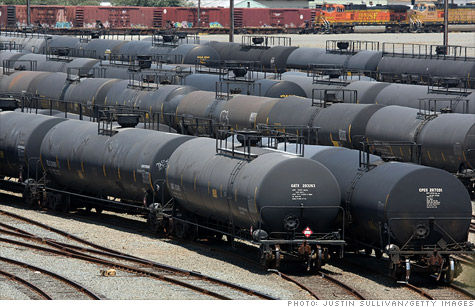
The U.S. still imports more than half its oil. But thanks to declining demand for products made from crude, the country is now supplying the rest of the world with gasoline.
NEW YORK (CNNMoney) -- The United States is awash in gasoline. So much so, in fact, that the country is exporting a record amount of it.
The country exported 430,000 more barrels of gasoline a day than it imported in September, according to the U.S. Energy Information Administration. That is about twice the amount at the start of the year, and experts and industry insiders say the trend is here to stay.
The United States began exporting gas in late 2008. For decades prior, starting in 1960, the country used all the gas it produced here plus had to import gas from places in Europe.
But demand for gas has dropped nearly 10% in recent years. It went from a peak of 9.6 million barrels a day in 2007 to 8.8 million barrels today, according to the EIA.
The drop was caused partially by the recession but also by the advent of more fuel efficient vehicles, higher prices and the greater use of ethanol as an ingredient in gasoline. Demand for other products made from crude oil like diesel and jet fuel has also declined, although not as much.
To be sure, the United States is still importing plenty of oil to make that gasoline -- and is still dependent on foreign countries for well over half the crude it uses. (Read: OPEC: We want clean energy.)
But now the country's massive refining infrastructure is producing more gasoline, diesel and jet fuel than the United States needs, freeing it up to be exported to places like Brazil, Mexico and Chile where demand is still strong.
The Wall Street Journal, which reported on the export trend last week, said the United States is on track this year to be a net exporter of refined products for the first time in 62 years.
"We've got plenty of excess refining capacity," said Jonathan Cogan, a spokesman for EIA. "It's a reminder that this is a global oil market, and it's reflected by the movements of products to where they will get the highest prices."
Mark Williams, global head of refining, trading and marketing for Royal Dutch Shell (RDSA), said exporting diesel and other refined products from the United States used to happen fairly irregularly but is now becoming much more common.
"It's growing as a new business," he said, although he cautioned that the United States would probably not become a huge exporter of fuel.
Still, the ability to export oil is good news for Shell and other oil companies like Exxon Mobil (XOM, Fortune 500), BP (BP) and Chevron (CVX, Fortune 500). They can use their extensive and modern refineries in the United States to make gasoline for the rest of the world.
But it may be bewildering for American drivers, who could experience record high gas prices next year even though U.S. demand could hit the lowest level in a decade, said Tom Kloza, chief oil analyst at the Oil Price Information Service.
"I can understand it, from a truck driver's perspective," said Kloza. "You're paying $4 or $4.50 a gallon to run your rig, yet we're exporting the crap out of this fuel. I'd be outraged too."
Still, he cautioned against restrictions on exports of diesel or gasoline, a move he expects politicians to at least talk about in 2012.
There's nothing forcing oil companies to bring crude to the United States to refine, Kloza said, noting that the refining industry employs thousands of workers. (Read: TransCanada agrees to re-route Keystone pipeline.)
"If you restrict exports, you'd really be looking for trouble," Kloza said. "You'd just see the refining and the jobs go offshore." 
First Published: December 5, 2011: 5:38 AM ET